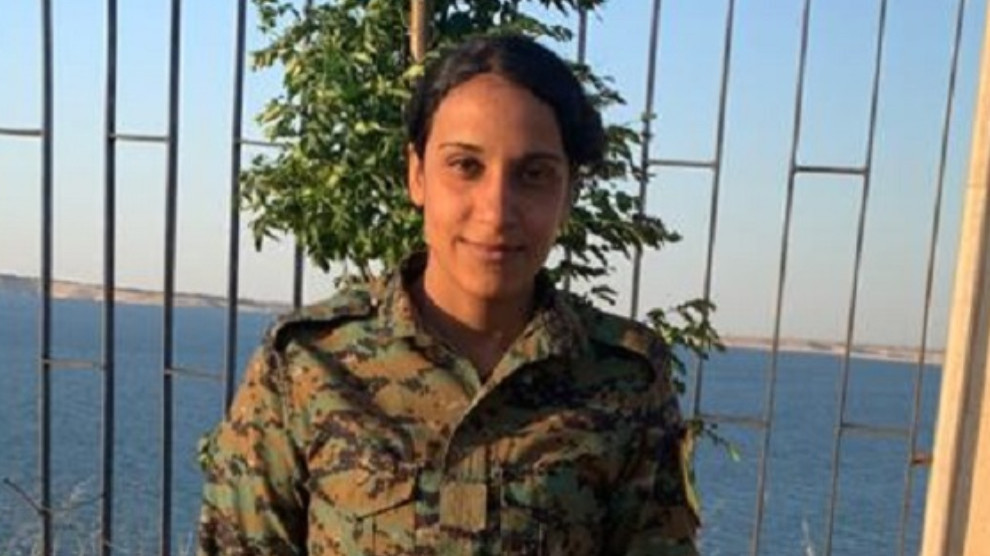Arab YPJ fighter Hebun Ereb: A journey from darkness to freedom
Arab YPJ fighter Hebun Ereb, who escaped from ISIS, talked about the ISIS persecution and called on women to claim their freedom.
Arab YPJ fighter Hebun Ereb, who escaped from ISIS, talked about the ISIS persecution and called on women to claim their freedom.

Women are leading the Rojava Revolution. The lives of women of many different peoples and sections of the society have changed with the revolution. Women who struggle in the social, political and military fields are building their future.
One of those who devoted her life to freedom is Hebun Ereb, one of the Arab women who joined the YPJ ranks.
Describing how she fell under the persecution of ISIS and how she regained freedom, Hebun Ereb has become the hope for women with her struggle.
Ereb said that they had to migrate to Raqqa because the war had intensified in Homs and its surroundings after the start of the Syrian crisis.
We were forced to move to Raqqa
Ereb said: "We didn't know that Raqqa was the capital of ISIS mercenaries. We didn't even know what ISIS was yet. ISIS mercenaries imposed their own laws on us. The first law they imposed was wearing black chador. I never wore a chador before immigrating to Raqqa. We were educated with religion books. There were no lessons on history or science. During the lessons at school, we were taught the essence of the religion of Islam. We were educated in a way that would serve the idea of ISIS and influence our thoughts, and to be the defenders of Islam."
Ereb continued: "ISIS mercenaries have nothing to do with Islam. These mercenary gangs make laws according to their own interests. And they do not act according to Islam.”
Ereb explained an incident that she never forgot during her time in the ISIS region: "I witnessed with my eyes some of the prisoners whose crime I don’t know – maybe they were regime soldiers – having their hands cuts, being shot in the head or being killed with injections. One of the prisoners killed was a father and there was his daughter there. They killed him with a bullet on his head in front of the girl's eyes. The face of the girl watching the death of her father is still in front of my eyes."
Married to an ISIS mercenary
Ereb was married to an ISIS mercenary: "I was married to a man from ISIS. I was subjected to pressure and violence at the hands of my husband. He just imposed me to be a housewife. He would not let me go out.
When an ISIS man wants a woman, it doesn't matter if the girl's consent or not to be married. It did not matter whether the family and daughter gave consent. After marrying an ISIS man, the girl was no longer allowed to even see her family as if she belonged only to her husband. If the ISIS mercenary died, the woman had to marry another ISIS mercenary. And all she had to do was immediately give birth to a child, cook and do housework. She was never allowed out. Even families put excessive pressure on their daughters to do only household chores and not to go out. Our lives were spent with pressure and cruelty."
Ereb explained why she joined the YPJ ranks as follows: “About a year ago, I joined because I was influenced by the YPJ. Later, I recognized that I was a woman, that I had a lot of power, I learned male power, and I started to understand myself. I lived with ISIS mercenaries for 2 years before Raqqa was liberated. To be honest, I was unaware of everything. I really did not know what women's freedom was. I had a hard time living with ISIS gangs because my past life was not like that."
I want to prove that I did not accept slavery
Ereb continued: "I wanted to join because Kurds, Arabs and Assyrians live and fight together in the YPJ. I also wanted to prove that I wanted to live freely and could live freely against the man who made me a slave. Before a year as a YPJ, I understood what woman was again. I joined to prove my family, friends and relatives that I can live as a free woman with my participation in the YPJ. In the YPJ ranks, I always want to stay among heavy weapons and on the war front and I want to prove myself.”
Ereb said: “While I was living in Homs, I could not take up arms and fight against the enemy, nor could I struggle. But here I can stand against the enemy and fight for my freedom by taking up arms. Women could not participate in the war in Homs. Here, the woman can do this if she wants. And I joined the YPJ because I really wanted to fight the enemy. When I had to emigrate from Homs, I suffered a lot because I could not fight. Now I will fight to protect our gains."
Addressing every woman under the oppression and persecution of the male power, Hebun Ereb pledge them to leave their slavery, feel free and fight.
Ereb said that a child was born from her forced marriage. "An uncle living in Turkey reproached me for living with my child. Even if my child's father is a gang mercenary, I cannot leave him because this child is a piece of my body. How can I give up on him? I want my son to grow up in an environment of freedom and the culture I teach him, which is opposite to that of his father, contrary to how is father lived. My child is still small and I will raise him as I believe is right."